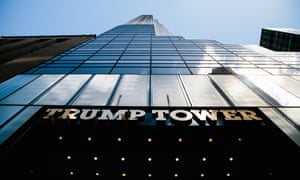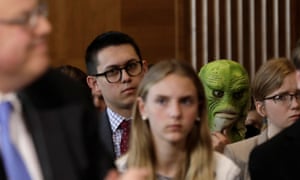Enough collusion talk. It's time to focus on Trump's corruption
If there is a silver lining to the confusion and disappointment of
Russiagate, it is that we can now pay attention to the real fleecing

One doesn’t have to go to Moscow to see it; pick almost any country in the world. Take my former home, Panama, famous for its canal and secret banks. Towering over the Panama City skyline is a 70 story hotel-casino shaped like a sailboat formerly known as the Trump Ocean Club. Trump had gifted it to his daughter Ivanka as her first real estate deal, which court records show earned Trump between $30m and $50m. Ivanka Trump put in charge of its sales a Brazilian financier, whom a Reuters investigation identified as an admitted money launderer with ties to Russian organized crime, who would later be arrested for fraud and forgery.
A Global Witness report turned up evidence the hotel project was being used to launder “proceeds from Colombian cartels’ narcotics trafficking”. When the hotel’s owners decided the Trump name was bad, even for business this shady, and ended their contract with his organization, Trump’s lawyers asked Panamanian president Juan Carlos Varela to intervene on Trump’s behalf.
In an erratic first term characterized by organizational chaos and constant turnover, the most consistent feature of the Trump presidency has been his use of office for personal enrichment. The Argentinian press reported that Trump asked President Mauricio Macri to resolve construction delays for a Trump building in Buenos Aires; both presidents denied the report, but construction resumed within days their call.
In India, Trump made licensing deals for buildings owned by Mangal Prabhat Lodha, a lawmaker and the vice-president of the ruling party, the BJP. Lodha’s partners met with Trump shortly after his election to discuss “US-India relations”. Trump’s son-in-law Jared Kushner has leveraged his somehow accepted position as acting secretary of state to win investments from the Chinese and Qatari governments in his own real estate business.
Meanwhile, Ivanka Trump has won licensing deals for her clothing line in China, which her father had labelled a currency manipulator before warming to president Xi, coincidentally just after the Chinese government approved trademarks for his and Ivanka Trump’s companies.
For legal scholars, the question of what to make of these gross conflicts of interest is a technical one: do they violate the constitution’s so-called emoluments clause, barring presidents from accepting “any present, emolument, office, or title” from foreign states? Constitutional originalists argue that emoluments, as the framers envisioned, had a narrow definition that do not include licensing fees for fashion companies and hotel-casinos, which is as tautological a defense as the fact that Trump has not been named a duke of the Habsburg Empire.
But there’s a simpler term for this: public corruption. It’s broader than hacking, and it’s well documented, if not nearly as breathlessly discussed on cable news.
The activist group Public Citizen collected records of over $15m Trump raked in from government agencies and political organizations such as the Pentagon, National Security Council, Republican National Committee and taxpayer dollars, which were spent money on everything from Trump restaurants to golf carts at Mar-a-Lago. Trump’s hotels have become an easy conduit for money from lobbyists both foreign and domestic. The Trump family business has earned a quarter million dollars in hotel fees from the Saudi government alone, another state Trump railed against on the campaign trail and made nice with once in office.
The big money comes from commercial tenants in Trump properties, which Forbes has estimated earns the president $175m a year, and include a Chinese state bank which rents a $2m office space in New York’s Trump Tower. Despite a much-hyped trade war with China, Trump is famously indebted to Chinese state banks, and two days after the Trump Organization received a $500m loan from the Chinese government, Trump announced he would lift sanctions against a Chinese telecom business. His tariffs also selectively excluded the country’s apparel industry, from which his daughter’s company imports its clothes.
Perhaps what has made these ongoing grifts so easy to overlook is that they are so unimaginative. There’s no grand conspiracy, no chalkboard linking spymasters to sleeper agents. What made Russiagate so seductive as the alpha and omega of Trump’s malfeasance was its promise that his very presence in office was illegitimate, that his misdeeds could be blamed on shadowy foreign forces rather than the country’s existing prejudices and mistrusts they exploited.
The Trump campaign’s defense was one of uncharacteristic humility: that it was too disorganized to carry out a conspiracy of the ages, and it’s a plausible argument. Real malfeasance is boring and obvious: sleaze your way into power and line your pockets while you have it. The Trump family is perfectly capable of that. It sees the presidency simply as a vehicle to extract maximum rents. If there is a silver lining to Russiagate’s anticlimactic conclusion, it should be to free up some attention for the real fleecing that’s going on, one that Congress has, until recently, been too distracted to stop.
https://www.theguardian.com/us-news/2019/mar/30/swamp-monster-monopoly-man-congress-protest
'Cause-play': swamp monsters and unicorns take on Congress
Humorously absurd characters have been appearing in the background of congressional hearings for Trump nominees

This week, the Senate energy and natural resources committee held a confirmation hearing for David Bernhardt, a former oil lobbyist who has been serving as the acting interior secretary since the resignation of Ryan Zinke in January. And as the committee pressed him on his lobbying record Thursday, a protester in the gallery highlighted the contradiction inherent in his nomination by dawning a swamp creature mask.
The sight of such a horrific swamp creature in the Senate, at least of the fantastical kind, isn’t an every day occurrence, but it’s the latest example of what has become a trend of late: satirical protest through the placement of humorously absurd characters in the background of hearings.
American Family Voices (@AFVhq)
March 14, 2019
Earlier this month a protester dressed as Marie Antoinette glanced over the shoulder of the commerce secretary, Wilbur Ross. The group American Family Voices, like many others, took umbrage with comments Ross and others in the administration had made during the government shutdown that seemed to echo Antoinette’s infamous dismissal of the living conditions of average people.
Rep Elizabeth Fiedler (@RepFiedler)
Is climate change “make believe” just like this unicorn in the audience? It is not. pic.twitter.com/EYU474c22xMarch 27, 2019
“We’re myths. Climate change isn’t,” they explained.
In April of last year they returned, this time as a “Russian troll” complete with bright blue troll wig during an appearance by the Facebook CEO Mark Zuckerberg in front of the commerce and judiciary committees.
“I think one reason I’ve taken the approach of kind of making a spectacle of myself is to actually steal away the spotlight from these lawmakers who want to grandstand in these hearings, and then not pass any meaningful legislation,” Madrigal has said.
“So hopefully by stealing their spotlight, I’m putting more pressure on them from their constituents to actually do their jobs.”
Since you’re here…
… we have a small favour to ask. More people around the world are reading The Guardian’s independent, investigative journalism than ever before. We’ve now been funded by over one million readers. And unlike many news organisations, we have chosen an approach that allows us to keep our journalism open to all. We believe that each one of us deserves access to accurate information with integrity at its heart.The Guardian is editorially independent, meaning we set our own agenda. Our journalism is free from commercial bias and not influenced by billionaire owners, politicians or shareholders. No one edits our editor. No one steers our opinion. This is important as it enables us to give a voice to those less heard, challenge the powerful and hold them to account. It’s what makes us different to so many others in the media, at a time when factual, honest reporting is critical.
Every contribution we receive from readers like you, big or small, goes directly into funding our journalism. This support enables us to keep working as we do – but we must maintain and build on it for every year to come. Support The Guardian from as little as £1 – and it only takes a minute. Thank you.





No comments:
Post a Comment